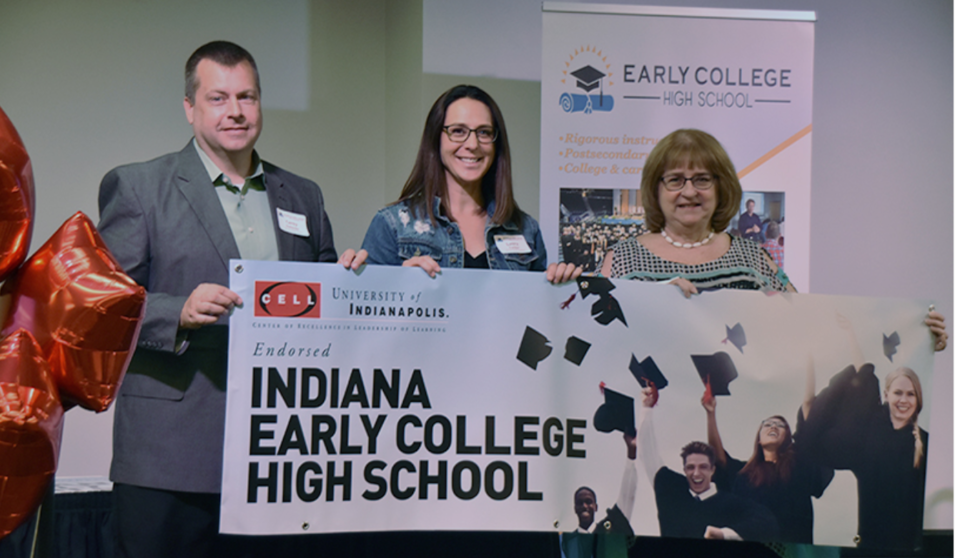The Rural Schools Collaborative is proud to announce the establishment of the new Indiana and Great Lakes Hub, which is anchored by the Center of Excellence in Leadership of Learning (CELL) at the University of Indianapolis. Along with the many schools of rural Indiana CELL currently works with, through this new partnership the Center will be able to provide support and curricular innovation to districts throughout the larger region.
Originally founded through a generous donation from the Lilly Endowment, Inc. in 2001, CELL quickly grew and has sustained efforts to improve STEM curricula, create school-to-community career pathways, and host professional development seminars for schools and educators across Indiana.
Dr. Jeremy Eltz, Director of Rural Education at CELL, came to the Center nearly a year ago after working on college and career readiness programs at two different university positions, creating strategies to boost STEM education for the Indiana

Department of Education, and teaching middle school science. Now at CELL, Dr. Eltz continues this work toward education innovation and sustainability with a team long accustomed to tackling the pressing challenges constricting the opportunities of Indiana students.
Whereas similar programs have had mixed results, Eltz attributes the Center’s continued longevity to its ability to “forecast down the road” and to “convene people while also being good thought partners.” A determination to support the state’s numerous rural districts has also been central to the program’s efforts. Eltz explains how CELL’s previous director, Janet Boyle, “realized rural schools have needs we aren’t addressing and started looking at different rural organizations to see what more we could do.” CELL’s foresight has awarded it a new federal grant “to implement rural early college programs around the state and to build a collaborative network for rural educators around Indiana.”
Through this new project, named the Rural Early College Network (RECN), Eltz and his colleagues are expanding early college programs at schools in an effort to not only help students reach post-secondary institutions, but to see them through the completion of those programs as well. More than sponsoring dual credit classes, Eltz explains that RECN encompasses “a whole ecosystem” of partners and actions focused on a diverse array of rural students:

“Concurrent enrollment [dual credit courses] is just one piece, to be a part of the early college program you have to have leadership teams in place made up of school administrators, counselors, and teachers; student advising; and college fieldtrips as well as parent advisory groups, the involvement of local partners, and a clear connection between college and the workforce.”
That connection to community, for Eltz, is critical. The success of these efforts arises “through the partnerships that would be formed, the community networking and buy-in from parents and local employers. That’s the approach we take; we try to get as large as a stakeholder group as we can brought into the model to sustain the effort. That’s been the approach CELL has always taken.”
In another step toward serving rural students and communities, Eltz is hopeful that this new partnership with the Rural Schools Collaborative will address a parallel issue for the districts working with CELL: the teacher shortage. “There’s a dire need for highly effective individuals to teach and stay in schools,” Eltz says, “That’s one of the things we can tackle with the [Rural Schools] Collaborative. With a rural teacher corps or a grow-your-own program, we can create a pipeline that preps students to come back and teach.”
RSC Board Chair, Carol Silvey, is looking forward to the new partnership with CELL. Reflecting on previous work she has done with the University of Indianapolis, she remarks that the University has long had a “great philanthropic spirit.” She explains that “they have always been on the cutting edge of education initiatives and program development. The Rural Early College Network at CELL is another great example of taking advantage of the opportunities out there to support rural schools and encourage young, dynamic students to consider teacher education programs.”
“We are most excited about the possibilities with this partnership,” Silvey adds. “We exist on the generosity of others and the programing at CELL is a perfect example of that generosity in action.”
Learn more about RSC's other Hub Partners.




